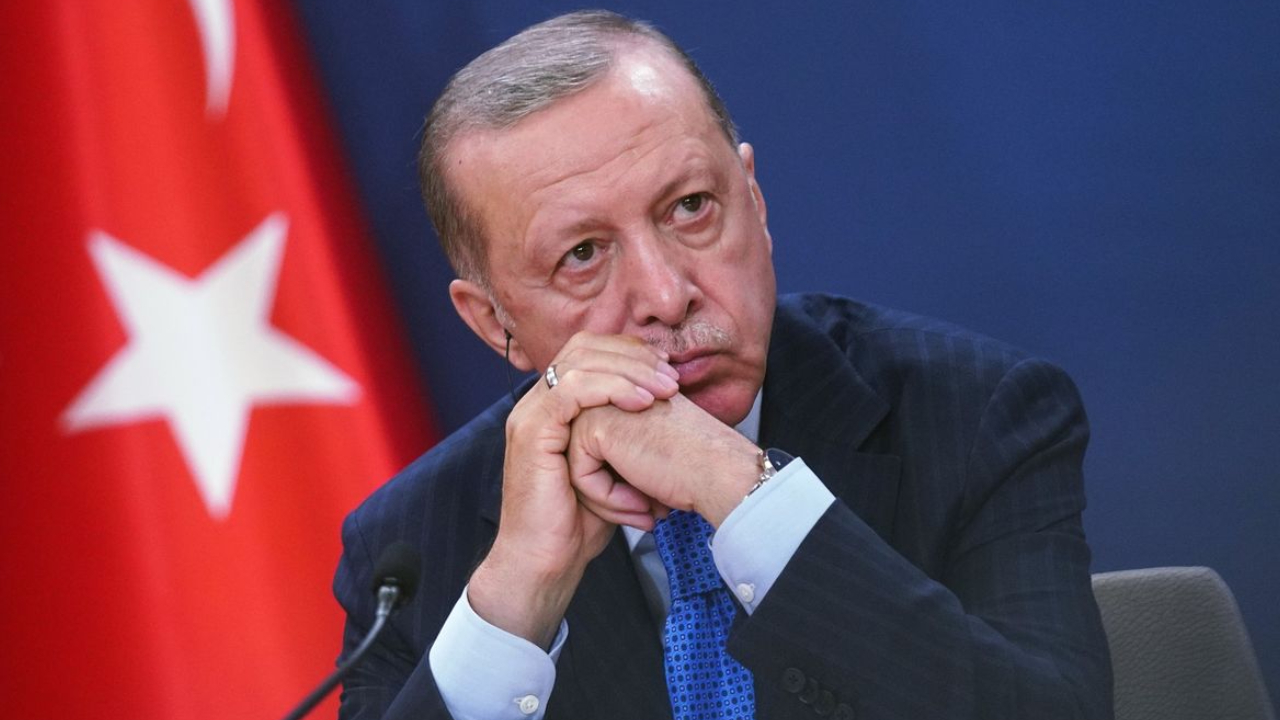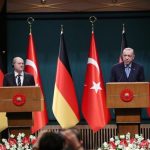Although Turkey’s Islamist president Recep Tayyip Erdoğan has been invincible for three decades, he may face electoral trouble in the presidential and parliamentary elections of June 2023, as the nation’s GDP has fallen precipitously while August inflation hit a 24-year high of 80 percent.
Recent research by an independent pollster, Yöneylem Sosyal Araştırmalar Merkezi, revealed that the sharp economic downturn, a direct result of Erdoğan’s mismanagement and foreign policy mistakes that have isolated Turkey, may do what his political opponents have failed to do until now.
The poll found that Erdoğan’s Justice and Development Party (AKP) would win 29.5 percent of the national vote if there were elections tomorrow, behind, for the first time, the main opposition Republican People’s Party (CHP), which would win 29.7 percent. Erdoğan’s political ally, the far-right Nationalist Movement Party (MHP) would win a mere 6.4 percent of the vote, bringing the support for the ruling alliance up to 35.9 percent. CHP’s main ally, The Good Party (IYI) would win 13.5 percent, lifting the opposition bloc to 43.2 percent
Yöneylem’s poll also found that 63 percent of respondents say Turkey is being “badly governed,” and 58.7 percent say that they “would never vote for Erdoğan.” Only 33.3 percent of the respondents said they would vote for Erdoğan while 55.6 percent said they would vote for the opposition candidate.
The numbers predict an easy win for the opposition and a historical defeat for Erdoğan. Clearly, 2023 will be the first election since 2022 in which Erdoğan is not the clear favorite. But a smooth, democratic transfer of power is unlikely.
Clearly, 2023 will be the first election since 2022 in which Erdoğan is not the clear favorite. But a smooth, democratic transfer of power is unlikely.
Six opposition parties, CHP, IYI and four small groupings with different ideologies, have come together to pick a joint presidential candidate against Erdoğan. The most likely candidate will be CHP leader Kemal Kılıçdaroğlu, a social democrat, although the opposition bloc has not yet announced a candidate. Various opinion polls put Kılıçdaroğlu’s approval rating far below Erdoğan’s. Although the opposition bloc seems to be more united than at any time under Erdoğan’s rule, the alliance also shows signs of fragility. Two parties in the opposition are former close allies of Erdoğan, a former prime minister and deputy prime minister. One ally is ideologically Islamist.
In this complex picture, Turkey’s Kurdish minority, representing 11-13 percent of the national electorate, will probably be the kingmaker. Erdoğan’s ultra-nationalist (and anti-Kurdish) policies have distanced Kurdish voters from his AKP, although Islamist Kurds still have a tendency to vote for him.
Erdoğan will not go down without a fight. And that “fight” may mean many unpleasant scenarios. Some small-scale hit-and-run operations against Kurdish targets in northern Syria can be portrayed by the Erdoğan-controlled media (90 percent of all) as heroic military stories. A lot of barking (but no real biting) over the Aegean Sea may hit Turkish headlines, making nationalistic Turks feel proud of their president. A new spiral of terror attacks may make Turks feel they must unite behind their president. Billions of dollars flowing unofficially into the Turkish economy, from friendly countries like Qatar and Russia, may make starving Turks feel like they will soon be better off.
Alternatively, Erdoğan could be tempted to manipulate the election results. He did so in critical local elections in 2019, when an opposition candidate won the Istanbul mayoral race by a margin of 13,000 votes. Erdoğan annulled the election results and ordered a rerun. In the renewed election, the opposition candidate, Ekrem Imamoğlu, won by a margin of 800,000 votes.
What will happen in post-June 2023 Turkey? Too early to say. But a few safe, innocent assumptions will not do any harm.
Erdoğan, as a political brand, is much stronger than his party, the AKP. If there were elections tomorrow, the AKP and MHP would most probably lose their parliamentary majority to opposition parties. The critical question is: What happens if Erdoğan wins the presidential election but the AKP and its allies lose their majority in parliament? The answer is chaos. Erdoğan won’t be able to pass laws in parliament. He can try to rule by issuing decrees. But that will not be sustainable. He would be forced into new elections.
What happens if Erdoğan loses the presidential election by a narrow margin, and the AKP and MHP lose their parliamentary majority — a total end of the Erdoğan era, in other words? A near civil war.
A more critical question: What happens if Erdoğan loses the presidential election by a narrow margin, and the AKP and MHP lose their parliamentary majority — a total end of the Erdoğan era, in other words? A near civil war.
Erdoğan’s violent loyalists will blame the defeat on a foreign plot, accusing the CIA, the Mossad, you name it. They will take to the streets to attack the enemy: secular, anti-Erdoğan Turks. The AKP has millions of militant party members across the country, organized under institutional names like the Ottoman Hearths. It also has a strong bond with the military contractor company SADAT, established by retired Islamist officers. SADAT is often accused of training paramilitary groups in Syria and Libya.
Erdoğan has long been preparing for the doomsday scenario. In October 2016, Turkey’s Directorate of Religious Affairs (Diyanet) issued a circular for the formation of “youth branches” to be associated with the country’s tens of thousands of mosques. Initially, the youth branches would be formed in 1,500 mosques. Under the plan, by 2021, 20,000 mosques would have youth branches and finally 45,000 mosques would have them. Secular Turks feared the youth branches might turn into Erdoğan’s “mosque militia,” like the Hitler Youth in Nazi Germany.
In every post-June 2023 scenario, Turkey just looks like a slow-sinking ship.
By: Burak Bekdil – an Ankara-based political analyst and a fellow at the Middle East Forum.
Source: ME Forum



